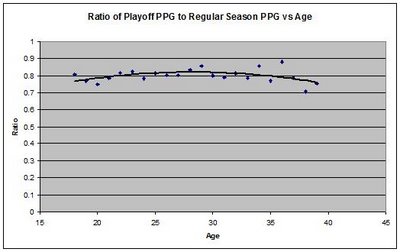Thursday, April 23, 2009
Playoff Performance by Age
There's no question that scoring rates drop during the playoffs, but James Mirtle wonders if it's fair to count "every game as being equal, whether those postseason games were played as an 18-year-old rookie, 27-year-old sniper or a 37-year-old greybeard..."
At first glance, it seems like a reasonable thing to do. The ratio between playoff and regular season scoring is shown below for ages 18-40:

And it's incredibly rare to play in the playoffs at either an old or young age - 94% of players in the playoffs are between 20 and 34 on January 1st of a given season. A linear fit indicates no relationship between age and scoring ratio, while a polynomial fit indicates a slight difference. Counting all games as equal seems like the right thing to do.
At first glance, it seems like a reasonable thing to do. The ratio between playoff and regular season scoring is shown below for ages 18-40:

And it's incredibly rare to play in the playoffs at either an old or young age - 94% of players in the playoffs are between 20 and 34 on January 1st of a given season. A linear fit indicates no relationship between age and scoring ratio, while a polynomial fit indicates a slight difference. Counting all games as equal seems like the right thing to do.
Comments:
Links to this post:
<< Home
It depends on how the PPG numbers are calculated. If you are comparing the yearly averages, then I agree with your conclusions. But most people just add up points and games played, and then calculate the averages based on that, which skews the numbers for the guys who play a lot of playoff games at 19 or 38. This is because playoff games played totals are much more variable than regular season ones.
For example, let's say there is a 20 year old rookie who scores 35 points in 70 games, and then 12 points in 24 games as his team wins the Cup. The next year he has a breakout season, scoring 100 points in 80 games, but his team is swept out in the first round even though he scores 5 points in the 4 games.
If you compare averages, you can see that his PPG is the same from the regular season to the playoffs. If you add up the totals, it looks like his scoring rate drops from 0.9 to 0.6 in the playoffs.
Post a Comment
For example, let's say there is a 20 year old rookie who scores 35 points in 70 games, and then 12 points in 24 games as his team wins the Cup. The next year he has a breakout season, scoring 100 points in 80 games, but his team is swept out in the first round even though he scores 5 points in the 4 games.
If you compare averages, you can see that his PPG is the same from the regular season to the playoffs. If you add up the totals, it looks like his scoring rate drops from 0.9 to 0.6 in the playoffs.
Links to this post:
<< Home
Subscribe to Posts [Atom]

